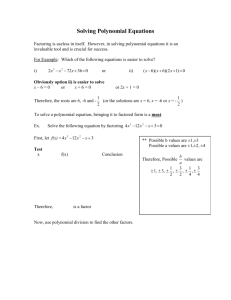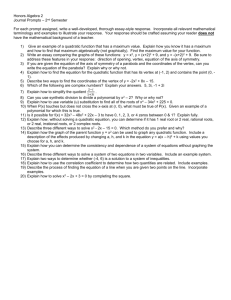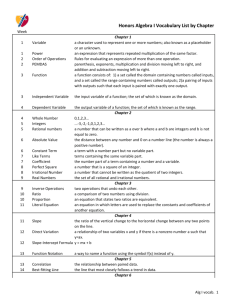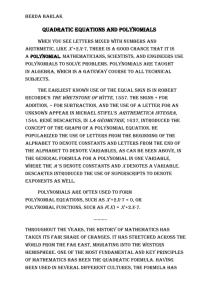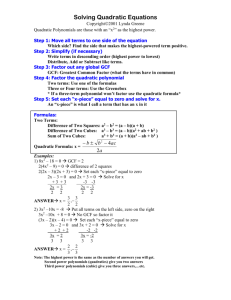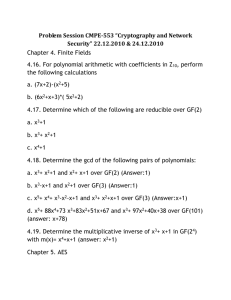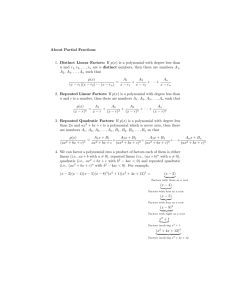x - Gordon State College
advertisement
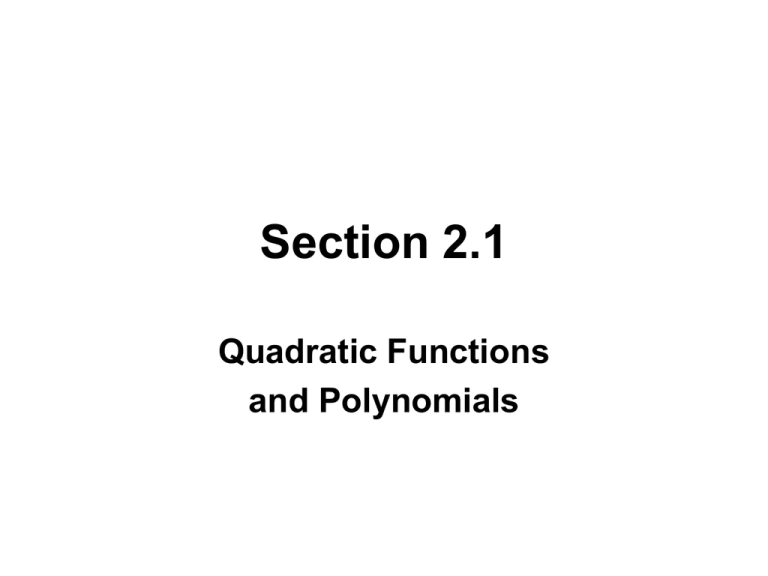
Section 2.1 Quadratic Functions and Polynomials EXAMPLE Suppose a baseball is dropped from the top of the Empire State Building. The table to the right shows (based on measurements) the distance d (in feet) the baseball has fallen after t seconds. t (sec) d (feet) 0 0 1 16 2 64 3 144 4 256 5 400 A FORMULA FOR DROPPED BASEBALL Note that d is not a linear functions of t. The distance d is given by the formula d= 16t2. t (sec) d (feet) 0 0 1 16 2 64 3 144 4 256 5 400 QUADRATIC FUNCTIONS Definition: A quadratic function is one of the form f (x) = ax2 + bx + c with a ≠ 0, so its formula involves a square term as well as linear and constant terms. GRAPHS OF QUADRATIC FUNCTONS Graph the following quadratic functions on your calculator. f (x) = x2 f (x) = -x2 f (x) = 3x2 f (x) = -2x2 f (x) = 6x2 f (x) = -0.75x2 f (x) = 0.5x2 f (x) = x2 – x – 6 f (x) = 0.1x2 f (x) = – 2x2 + 3x + 1 PARABOLAS The graph of a quadratic function is a parabola. The low point (or high point) is called the vertex. The vertex is also the place where the graph changes direction. The quadratic function f (x) = ax2 + bx + c b has its vertex at the x-value x . 2a To find the y-coordinate, substitute this value in for x. POWER FUNCTIONS Definition: A power function is one of the form f (x) = xk where k is a given constant, which can either be positive or negative, either an integer or a fraction. GRAPHS OF POWER FUNCTIONS Graph the following power functions. f (x) = x2 f (x) = x f (x) = x1/2 f (x) = x4 f (x) = x3 f (x) = x1/3 f (x) = x6 f (x) = x5 POLYNOMIALS Definition: A polynomial function (or simply a polynomial) is a sum of constant multiples of the power functions 1, x, x2, x3, . . . xn, . . . The degree of the polynomial is equals the exponent of the highest power appearing among its terms. THE “END BEHAVIOR” OF A POLYNOMIAL The end behavior of a graph is what the shape of the graph is on the extreme left and extreme right. The end behavior of a polynomial is the same the end behavior of the term with the highest power. TURNING POINTS OF POLYNOMIALS In general, the graph of a polynomial can have as many degree - 1 turning points (or “bends”). In other words, if the degree of the polynomial is n, the graph can have as many as n - 1 turning points (or “bends”). SOLVING POLYNOMIAL EQUATIONS Principle: Graphic Solution of Equations The solutions of the equation f (x) = 0 are precisely the x-intercepts of the graph y = f (x). Recall, x-intercepts are the places where the graph crosses (or touches) the x-axis.
